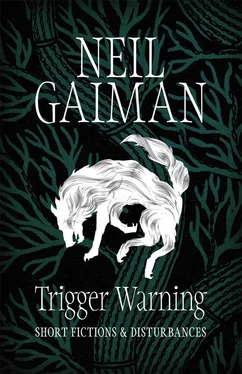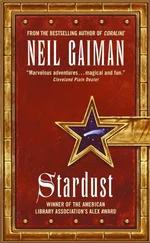Neil Gaiman - Trigger Warning - Short Fictions and Disturbances
Здесь есть возможность читать онлайн «Neil Gaiman - Trigger Warning - Short Fictions and Disturbances» весь текст электронной книги совершенно бесплатно (целиком полную версию без сокращений). В некоторых случаях можно слушать аудио, скачать через торрент в формате fb2 и присутствует краткое содержание. Год выпуска: 2015, Издательство: Headline, Жанр: Старинная литература, на английском языке. Описание произведения, (предисловие) а так же отзывы посетителей доступны на портале библиотеки ЛибКат.
- Название:Trigger Warning: Short Fictions and Disturbances
- Автор:
- Издательство:Headline
- Жанр:
- Год:2015
- ISBN:нет данных
- Рейтинг книги:4 / 5. Голосов: 1
-
Избранное:Добавить в избранное
- Отзывы:
-
Ваша оценка:
- 80
- 1
- 2
- 3
- 4
- 5
Trigger Warning: Short Fictions and Disturbances: краткое содержание, описание и аннотация
Предлагаем к чтению аннотацию, описание, краткое содержание или предисловие (зависит от того, что написал сам автор книги «Trigger Warning: Short Fictions and Disturbances»). Если вы не нашли необходимую информацию о книге — напишите в комментариях, мы постараемся отыскать её.
Trigger Warning: Short Fictions and Disturbances — читать онлайн бесплатно полную книгу (весь текст) целиком
Ниже представлен текст книги, разбитый по страницам. Система сохранения места последней прочитанной страницы, позволяет с удобством читать онлайн бесплатно книгу «Trigger Warning: Short Fictions and Disturbances», без необходимости каждый раз заново искать на чём Вы остановились. Поставьте закладку, и сможете в любой момент перейти на страницу, на которой закончили чтение.
Интервал:
Закладка:
As my face grew unfamiliar, and my finger joints swelled and ached (not so much as they might have done, though, which I attributed to the many bee stings I had received in my first few years as an investigative apiarist) and as Watson, dear, brave, obtuse Watson, faded with time and paled and shrank, his skin becoming greyer, his moustache becoming the same shade of grey as his skin, my resolve to conclude my researches did not diminish. If anything, it increased.
So: my initial hypotheses were tested upon the South Downs, in an apiary of my own devising, each hive modelled upon Langstroth’s. I do believe that I made every mistake that ever a novice beekeeper could or has ever made, and in addition, due to my investigations, an entire hiveful of mistakes that no beekeeper has ever made before, or shall, I trust, ever make again. The Case of the Poisoned Beehive, Watson might have called many of them, although The Mystery of the Transfixed Women’s Institute would have drawn more attention to my researches, had anyone been interested enough to investigate. (As it was, I chided Mrs Telford for simply taking a jar of honey from the shelves here without consulting me, and I ensured that, in the future, she was given several jars for her cooking from the more regular hives, and that honey from the experimental hives was locked away once it had been collected. I do not believe that this ever drew comment.)
I experimented with Dutch bees, with German bees and with Italians, with Carniolans and Caucasians. I regretted the loss of our British bees to blight and, even where they had survived, to interbreeding, although I found and worked with a small hive I purchased and grew up from a frame of brood and a queen cell, from an old abbey in St Albans, which seemed to me to be original British breeding stock.
I experimented for the best part of two decades, before I concluded that the bees that I sought, if they existed, were not to be found in England, and would not survive the distances they would need to travel to reach me by international parcel post. I needed to examine bees in India. I needed to travel perhaps further afield than that.
I have a smattering of languages.
I had my flower-seeds, and my extracts and tinctures in syrup. I needed nothing more.
I packed them up, arranged for the cottage on the Downs to be cleaned and aired once a week, and for Master Wilkins – to whom I am afraid I had developed the habit of referring, to his obvious distress, as ‘Young Villikins’ – to inspect the beehives, and to harvest and sell surplus honey in Eastbourne market, and to prepare the hives for winter.
I told them I did not know when I should be back.
I am an old man. Perhaps they did not expect me to return.
And, if this was indeed the case, they would, strictly speaking, have been right.
***
Old Gao was impressed, despite himself. He had lived his life among bees. Still, watching the stranger shake the bees from the boxes, with a practised flick of his wrist, so cleanly and so sharply that the black bees seemed more surprised than angered, and simply flew or crawled back into their hive, was remarkable. The stranger then stacked the boxes filled with comb on top of one of the weaker hives, so Old Gao would still have the honey from the hive the stranger was renting.
So it was that Old Gao gained a lodger.
Old Gao gave the Widow Zhang’s granddaughter a few coins to take the stranger food three times a week – mostly rice and vegetables, along with an earthenware pot filled, when she left at least, with boiling soup.
Every ten days Old Gao would walk up the hill himself. He went initially to check on the hives, but soon discovered that under the stranger’s care all eleven hives were thriving as they had never thrived before. And indeed, there was now a twelfth hive, from a captured swarm of the black bees the stranger had encountered while on a walk along the hill.
Old Gao brought wood, the next time he came up to the shack, and he and the stranger spent several afternoons wordlessly working together, making extra boxes to go on the hives, building frames to fill the boxes.
One evening the stranger told Old Gao that the frames they were making had been invented by an American, only seventy years before. This seemed like nonsense to Old Gao, who made frames as his father had, and as they did across the valley, and as, he was certain, his grandfather and his grandfather’s grandfather had, but he said nothing.
He enjoyed the stranger’s company. They made hives together, and Old Gao wished that the stranger was a younger man. Then he would stay there for a long time, and Old Gao would have someone to leave his beehives to, when he died. But they were two old men, nailing boxes together, with thin frosty hair and old faces, and neither of them would see another dozen winters.
Old Gao noticed that the stranger had planted a small, neat garden beside the hive that he had claimed as his own, which he had moved away from the rest of the hives. He had covered it with a net. He had also created a ‘back door’ to the hive, so that the only bees that could reach the plants came from the hive that he was renting. Old Gao also observed that, beneath the netting, there were several trays filled with what appeared to be sugar solution of some kind, one coloured bright red, one green, one a startling blue, one yellow. He pointed to them, but all the stranger did was nod and smile.
The bees were lapping up the syrups, though, clustering and crowding on the sides of the tin dishes with their tongues down, eating until they could eat no more, and then returning to the hive.
The stranger had made sketches of Old Gao’s bees. He showed the sketches to Old Gao, tried to explain the ways that Old Gao’s bees differed from other honeybees, talked of ancient bees preserved in stone for millions of years, but here the stranger’s Chinese failed him, and, truthfully, Old Gao was not interested. They were his bees, until he died, and after that, they were the bees of the mountainside. He had brought other bees here, but they had sickened and died, or been killed in raids by the black bees, who took their honey and left them to starve.
The last of these visits was in late summer. Old Gao went down the mountainside. He did not see the stranger again.
***
It is done.
It works. Already I feel a strange combination of triumph and of disappointment, as if of defeat, or of distant storm clouds teasing at my senses.
It is strange to look at my hands and to see, not my hands as I know them, but the hands I remember from my younger days: knuckles unswollen, dark hairs, not snow-white, on the backs.
It was a quest that had defeated so many, a problem with no apparent solution. The first emperor of China died and nearly destroyed his empire in pursuit of it, three thousand years ago, and all it took me was, what, twenty years?
I do not know if I did the right thing or not (although any ‘retirement’ without such an occupation would have been, literally, maddening). I took the commission from Mycroft. I investigated the problem. I arrived, inevitably, at the solution.
Will I tell the world? I will not.
And yet, I have half a pot of dark brown honey remaining in my bag; a half a pot of honey that is worth more than nations. (I was tempted to write, worth more than all the tea in China, perhaps because of my current situation, but fear that even Watson would deride it as cliché.)
And speaking of Watson . . .
There is one thing left to do. My only remaining goal, and it is small enough. I shall make my way to Shanghai, and from there I shall take ship to Southampton, a half a world away.
And once I am there, I shall seek out Watson, if he still lives – and I fancy he does. It is irrational, I acknowledge, and yet I am certain that I would know, somehow, had Watson passed beyond the veil.
Читать дальшеИнтервал:
Закладка:
Похожие книги на «Trigger Warning: Short Fictions and Disturbances»
Представляем Вашему вниманию похожие книги на «Trigger Warning: Short Fictions and Disturbances» списком для выбора. Мы отобрали схожую по названию и смыслу литературу в надежде предоставить читателям больше вариантов отыскать новые, интересные, ещё непрочитанные произведения.
Обсуждение, отзывы о книге «Trigger Warning: Short Fictions and Disturbances» и просто собственные мнения читателей. Оставьте ваши комментарии, напишите, что Вы думаете о произведении, его смысле или главных героях. Укажите что конкретно понравилось, а что нет, и почему Вы так считаете.







